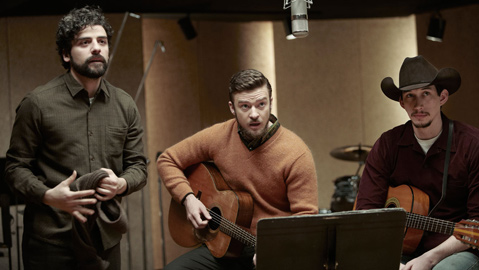Review: Inside Llewyn Davis
Oscar Isaac, Carey Mulligan, and John Goodman star in a film written and directed by Joel and Ethan Coen.

In this strangely compelling rogue’s tale, another jewel in the Coen Brothers’ cinema crown, the American auteurs step at least a bit outside their dark-comic comfort zone, addressing a particular scene and cultural saga in history — with a strong backdrop of the challenges to integrity in music and art. Inspired by the story of tragically hip, underrated folk hero Dave Von Ronk — an inspiration and scruffy avuncular ally to the Village-bound Bob Dylan in the early ‘60s — the film proceeds with the some of the Coen-esqueries we love, including left-hook satirical humor (one memorable line: “where’s the scrotum?”), but also a fresh, Jim Jarmusch-like Zen slacker quality and texture.
Oscar Isaac plays, and powerfully, the titular character, a mopey but musically gifted hopeful on the early ‘60s NYC folk scene, trying to maintain his integrity and have his voice heard in a scene full of whitebread, Kingston Trio-esque folkies in sweaters, and savvy gimmick-flingers (like his friend, played by Justin Timberlake). It’s a canny touch on the Coens’ part that we only really hear “real” musical voice twice along the wintry gray-ish path of the story, as Llewyn soulfully plays for a group of older men (a club owner, his rest-home bound father) who respond in varied shades of indifference.
Llewyn is a misunderstood poet, but a scoundrel, too, who has gotten a singer friend (Carey Mulligan) pregnant, preys upon the kindness and couch-surfing rights of family and “friends,” and channels his frustration into cruelly berating an “actual,” autoharp-wielding, older American folk singer at the Gaslight. Musical angles continually sneak into the narrative mix. In the film’s quasi-road movie scenario, along his hapless travels to a hoped-for gig in Chicago, Llewyn happens upon a jazz-loving and health-challenged hipster/shaman played by John Goodman, who regales him with the jazz vs. folk equation: “In jazz, we play all 12 notes in the scale, not just three chords and a ukulele.”
Tucked into the folds of this deceptively low-key tale are understated, enriching storytelling turns on the Coens’ part, including a cat named Ulysses (giving a Homeric spin to the self-discovery arc of the tale), and a loopy, time-bending framing device of a folk club scene, with young Dylan doing his soon-to-be legendary Hibbings drawl in the background. Llewyn, at root, is a new kinda’ laconic “Dude,” torn from the cloth of American cultural history, and the wonderful, warped world according to the Coens.



